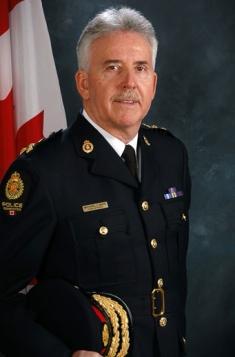A new organization called Community Response Project is condemning the Edmonton Police Service’s (EPS) queer liaison committee, saying it no longer serves the city’s queer community.
The Community Response Project is a grassroots organization in Edmonton that formed in response to the recent attack on Shannon Barry.
On April 17, Barry was walking home from a bar with friends when a group of men yelled homophobic slurs at them. One of the men kicked Barry in the face, leaving her with a broken jaw, a crushed left eye socket and facial nerve damage. A police officer was called to the scene but waited five days to file the report. Since then, Edmonton police Chief Mike Boyd has publicly apologized to Barry and initiated an internal review.
Last week, police charged a 14-year-old boy with aggravated assault in relation to the incident, but the EPS Hate Crime Unit has since said the assault is not a hate crime.
On Friday, the EPS queer liaison committee released an open letter (PDF) that has outraged some members of the Community Response Project. The group, which has more than 800 members on Facebook and about 40 active members, says the letter merely summarizes steps the EPS has taken without being critical of how the case was handled.
“This letter shows that the liaison committee is more aligned with the Edmonton Police Service’s public relations machine than it is with the members of our queer community,” says Lucas Crawford of the Community Response Project.
Crawford says he’s “deeply disappointed” by the “seemingly neutral tone” of the letter and pointed to the committee’s repeated use of the words “alleged” and “allegedly” when referencing the attack.
“I certainly believe in innocent until proven guilty, but it takes a very small amount of effort and self awareness to write in a way that is legal, fair and thoughtful,” says Crawford. “The repeated use of the word ‘alleged’ just shows that they have not even considered going out of their way to speak to the community.”
The Community Response Project refers to the EPS’s internal review as “meaningless.” The group is calling for an investigation to find out whether homophobia played a role in the EPS’s response to the officer’s failure to file a timely report. The group is also concerned that the liaison committee accepts without question the EPS view that the attack is not a hate crime.
“Whether or not the attack meets the legal threshold of a hate crime is immaterial,” says Crawford. “We have seen the bruises on Shannon’s face, and we know the words her attackers used.”
In its letter, the liaison committee also acknowledged the police chief’s public apology and its “timely arrest of the alleged perpetrator.”
But Crawford says it’s a case of “too little, too late.” He says the apology was merely an attempt to appease the queer community and that the liaison committee should be more critical of authority.
“I think the reason we’ve been frustrated is that the liaison committee has seen its role as helping to placate the community when, in queer communities all over Canada, refusing to be placated and demanding change is seen as a positive thing,” he says.
Kris Wells, the co-chair of the liaison committee, disagrees that the committee is siding with the EPS.
“We don’t feel that way at all,” he says.
Wells says the role of the liaison committee is to hold the EPS accountable and that in its 18-year history, the committee has been a vocal critic of the EPS when it’s been warranted.
“This is a committee that chooses to work within the institution, and in this case, within the police service, rather than working against it, but that doesn’t mean that we’re not accountable. We want to ensure that [police] processes are fair and transparent, and when we believe they’re not, we’re there to actively question and critique.”
Wells says the committee, which is currently made up of 14 individual volunteers, doesn’t claim to speak for the entire queer community. He says the committee welcomes more volunteers with diverse viewpoints and is in favour of open dialogue.
“It’s surprising to critique the liaison committee without attempting to contact us, but we’re certainly open to having a good constructive dialogue,” he says.
But Crawford says it’s up to the committee to liaise with the queer community.
“Liaise is an action word, and I think it’s the responsibility of the committee to liaise with its community,” Crawford says. “I think when they accept active, innovative engagement as their role, then they’ll be able to speak with more authority and more representation and, at present, they don’t.”
Crawford says he hopes the committee will spend more time in the future representing the queer community and less time summarizing police activity.
“We can read what the EPS thinks in the newspaper too,” says Crawford. “We don’t need a queer voice repeating it and giving it validity.”
In the meantime, the Community Response Project is working on a Know Your Rights campaign that will teach members of the queer community what their rights are when approached by a law enforcement officer. The group says this isn’t a case of “one bad apple” but “a systemic lack of police accountability and pervasive problems of violence in Edmonton.”
Wells says he has since been in contact with the Community Response Project and is waiting for a response. He hopes the two groups can figure out a way to move forward without polarizing the community.

 Why you can trust Xtra
Why you can trust Xtra


